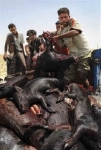30 April 2009
Klein: ‘Swine flu being used to persecute Christians.’ ‘We’re being humiliated, our livelihood taken away.’
 Egyptian authorities began slaughtering the roughly 300,000 pigs in the country as a precaution against swine flu even though no cases have been reported here, infuriating farmers who resisted the move and demanded compensation. (AP Photo/Nasser Nouri)
Egyptian authorities began slaughtering the roughly 300,000 pigs in the country as a precaution against swine flu even though no cases have been reported here, infuriating farmers who resisted the move and demanded compensation. (AP Photo/Nasser Nouri)
Aaron Klein, Jerusalem bureau chief for World Net Daily, reports:
An Egypt government policy to slaughter the country’s pigs as a stated precaution against swine flu is also aimed at targeting and weakening Egypt’s long-persecuted Christian community, charged local Christian leaders.
Members of the Egyptian Christian Copt community, speaking in interviews with WND today, said Egyptian authorities set up checkpoints in their communities and were harassing local Christians.
Almost the entire pig farming community in Egypt is run by Coptic Christians, who constitute between 8 and 15 percent of Egypt’s population depending on which statistical information is used.
Egypt yesterday started seizing and slaughtering herds of pigs in a bid to rid the country of its swine, explaining it was a safety precaution against swine flu. The move was heavily criticized by the United Nations, which put out a statement that the mass cull of up to 400,000 pigs was “a real mistake” since the new flu strain has not been found in pigs.
World health organizations explained the H1N1 swine flu virus is spread by people, not pigs. Muslims view pigs as unclean. In the Middle East, various superstitions have been perpetuated in the Arab media the past few days about how pigs spread the disease.
According to Coptic leaders in Egypt, officials from the country’s health and agriculture ministries who are known to be sympathizers of the fundamentalist Muslim Brotherhood made the decision to slaughter Egypt’s pigs. The Christians spoke to WND on condition of anonymity out of fear of retaliation.
A Muslim journalist for one of the country’s state-run newspapers confirmed to WND that some top health and agriculture ministry officials publicly leading the swine killing charge are known Islamists. But he said that it was not clear whether they were connected to the Muslim Brotherhood, which is in the opposition in Egypt.
“They are trying to take away our income,” charged one Coptic leader. “Thousands of Christians lost their income.”
Local Christians told WND the Egyptian government set up checkpoints in Coptic communities, such as Delta, Behma and other known Coptic strongholds.The checkpoints, the Christians said, was to ensure locals don’t try to hide pigs by transferring the swine out of the farms.
The local Christians claimed Egyptian security forces were humiliated them at the checkpoints.
“They are forcing us to strip, like we might have pigs under our clothes. I think they are recovering for a campaign of harming and humiliating Christians,” said a local Christian.
Coptic Christians have been targeted by Islamist violence several times the past few years. In 2007, in one example, Muslims in Egypt attacked local Christians and set fire to their shops and homes after the Christian community was accused of attempting to build a church. The Egyptian government heavily restricts the construction or enlargement of churches, requiring permits for any Christian building.
Christians are effectively restricted from senior Egyptian government, military or educational positions, and any worship services require the permission of the government.
The Coptic Church, a major Christian community in Egypt, reportedly dates back to the origins of Christianity. Christians were the majority in Egypt until several centuries after the Arab conquest of the seventh century.
Meanwhile, Egyptian Agriculture Minister Amin Abaza said authorities already confiscated more than 1,000 pigs and that he was seeking military help for the slaughter.
The Egyptian media reported the slaughter of the country’s estimated 400,000 pigs could take up to a month to complete
09:42 Posted in Egypt | Permalink | Comments (0) | ![]() Facebook |
Facebook |



















The comments are closed.